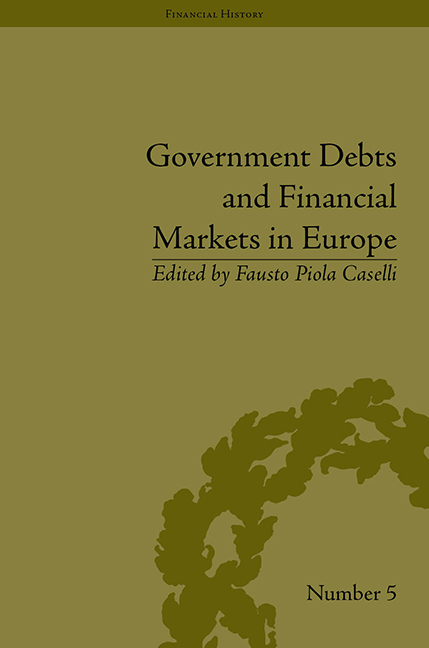Book contents
- Frontmatter
- CONTENTS
- Contributors
- List of Charts and Tables
- Introduction
- 1 The Financial Administration of North Hanseatic Cities in the Late Middle Ages: Development, Organization and Politics
- 2 Government Debts and Credit Markets in Renaissance Italy
- 3 Government Debts and Financial Markets in Castile between the Fifteenth and Sixteenth Centuries
- 4 Government Debt and Financial Markets: Exploring Pro-Cycle Effects in Northern Italy during the Sixteenth and the Seventeenth Centuries
- 5 Government Policies and the Development of Financial Markets: The Case of Madrid in the Seventeenth Century
- 6 The Role Played by Short-Term Credit in the Spanish Monarchy's Finances
- 7 From Subordination to Autonomy: Public Debt Policies and the Creation of a Self-Ruled Financial Market in the Kingdom of Naples in the Long Run (1500–1800)
- 8 Public Debt in the Papal States: Financial Market and Government Strategies in the Long Run (Seventeenth–Nineteenth Centuries)
- 9 Towards a New Public Credit Policy in Eighteenth-Century Spain: the Introduction of the Tesorería Mayor de Guerra (1703–6)
- 10 French Public Finance between 1683 and 1726
- 11 Long-Term War Loans and Market Expectations in England, 1743–50
- 12 Mercantilist Institutions for the Pursuit of Power with Profit: The Management of Britain's National Debt, 1756–1815
- 13 Italian Government Debt Sustainability in the Long Run, 1861–2000
- 14 Times of Wasteful Abundance: The Apogee of the Fiscal State in the Federal Republic of Germany from the 1960s to the 1980s
- Conclusion: Final Remarks
- Notes
- Bibliography
- Index
6 - The Role Played by Short-Term Credit in the Spanish Monarchy's Finances
- Frontmatter
- CONTENTS
- Contributors
- List of Charts and Tables
- Introduction
- 1 The Financial Administration of North Hanseatic Cities in the Late Middle Ages: Development, Organization and Politics
- 2 Government Debts and Credit Markets in Renaissance Italy
- 3 Government Debts and Financial Markets in Castile between the Fifteenth and Sixteenth Centuries
- 4 Government Debt and Financial Markets: Exploring Pro-Cycle Effects in Northern Italy during the Sixteenth and the Seventeenth Centuries
- 5 Government Policies and the Development of Financial Markets: The Case of Madrid in the Seventeenth Century
- 6 The Role Played by Short-Term Credit in the Spanish Monarchy's Finances
- 7 From Subordination to Autonomy: Public Debt Policies and the Creation of a Self-Ruled Financial Market in the Kingdom of Naples in the Long Run (1500–1800)
- 8 Public Debt in the Papal States: Financial Market and Government Strategies in the Long Run (Seventeenth–Nineteenth Centuries)
- 9 Towards a New Public Credit Policy in Eighteenth-Century Spain: the Introduction of the Tesorería Mayor de Guerra (1703–6)
- 10 French Public Finance between 1683 and 1726
- 11 Long-Term War Loans and Market Expectations in England, 1743–50
- 12 Mercantilist Institutions for the Pursuit of Power with Profit: The Management of Britain's National Debt, 1756–1815
- 13 Italian Government Debt Sustainability in the Long Run, 1861–2000
- 14 Times of Wasteful Abundance: The Apogee of the Fiscal State in the Federal Republic of Germany from the 1960s to the 1980s
- Conclusion: Final Remarks
- Notes
- Bibliography
- Index
Summary
It is widely known that the Spanish monarchy borrowed large quantities of money from foreign bankers during the sixteenth and seventeenth centuries. Many foreign companies, especially Italian, provided money and financial services to the Spanish kings. Scholars have described the financial system of Castile and the important role played by short-term credit in maintaining imperial policy.
The Spanish monarchy, like other medieval and early modern European sovereigns, had problems making credible commitments to honour its financial agreements. Periodically, bankers faced suspension of payments and defaults in the contracts signed by the Crown. A traditional interpretation of these crises maintains that they damaged the relationship between the monarchy and its bankers, increasing the price of short-term credit compared with other borrowing alternatives.
The history of Spanish sovereign debt in this period poses a puzzle: why did bankers continue to lend money to the kings of Spain when they repeatedly suspended their payments? As might be expected, the king could cancel his obligations whenever he wanted to after the lender had risked his money. One could argue that reputation and future borrowing needs would prevent the monarchy from cheating the banker. However, both bankers and the king knew their relationship had a finite life, so bankers in the later period could anticipate that the king would default. Carrying this logic further back would lead to an outcome in which lending would not have been provided in any period.
Historical evidence proves, however, that despite the finite horizon and repeated cheating on the part of the king, lenders and the Spanish monarchy continued to cooperate and maintain a strong credit relationship over time. It also shows that it did not make this kind of credit more expensive than others. The system worked in such a way that many small investors around Europe helped bankers to lend their money to the Spanish kings.
Did bankers make ‘irrational’ economic decisions? The situation is especially noteworthy given the fact that bankers did not coordinate their actions.
- Type
- Chapter
- Information
- Government Debts and Financial Markets in Europe , pp. 81 - 96Publisher: Pickering & ChattoFirst published in: 2014



